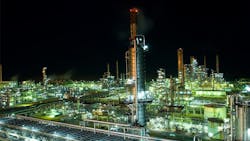Pertamina courts UAE investor to partner on Balikpapan refinery upgrade
State-owned PT Pertamina has entered a principle agreement with Mubadala Investment Co. of the United Arab Emirates to further evaluate investment cooperation opportunities in the processing sector, including a potential joint investment to accelerate development of Pertamina’s previously announced $3.9-billion Balikpapan Refining Development Master Plan (RDMP) project to upgrade and modernize its 260,000-b/sd refinery in Balikpapan, East Kalimantan, Indonesia (OGJ, Dec. 13, 2018).
Signing of the principle agreement comes as part of Pertamina and Mubadala's commitment as one of the investors who expressed interest in developing the Balikpapan RDMP and establishes the ongoing partnership process to due diligence and negotiation stages, said Nicke Widyawati, Pertamina’s president director.
"This shows the seriousness of the two parties to reach a business agreement in order to accelerate the development of Balikpapan RDMP, as mandated by the government to Pertamina," Widyawati said.
According to Widyawati, Pertamina is currently looking for capital investment partners to join in developing the Balikpapan RDMP in a process that began in May 2019 with issuance of a teaser to targeted prospective investors consisting of international oil and gas companies, trading companies, and financial investors.
Following the teaser’s release, several investors sent letter of interest to Pertamina, but for Balikpapan RDMP, targeted potential partners were financial investors since the project has already entered the construction phase.
Mubadala—which is one of the potential financial investors that meets Pertamina’s criteria—also has the technical competence that Pertamina expects will assist in project management, Widyawati said.
The principle agreement follows previously developed relationships in the upstream, processing, and petrochemical sectors between Mubadala, Pertamina, and Indonesia, according to Pertamina.
Pertamina estimates the total investment needed for Balikpapan RDMP is about $5.5 billion.
The Indonesian operator previously awarded a $2.17-billion turnkey contract to Hyundai Engineering Co. Ltd. to provide engineering, procurement, and construction services for Balikpapan RDMP, which was to last 53 months from the start of construction (OGJ, Sept. 17, 2019).
Alongside expanding the refinery’s crude processing capacity by 100,000 b/sd to 360,000 b/sd, the proposed Balikpapan RDMP also will include construction of units that will equip the refinery to produce fuels meeting Euro 5-quality standards.
The Balikpapan RDMP project comes as part of the Pertamina’s broader 10-year, $30-billion plan to revitalize and expand operational capability of its Indonesian refineries by doubling existing overall processing capacity to 2 million b/d by 2026 to meet the country’s growing demand for cleaner petroleum-derived products and reduce its dependence on foreign imports (OGJ Online, Dec. 15, 2014; Oct. 7, 2013).
RDMP phases
Due to be completed in 2021, Balikpapan’s RDMP Phase 1—which is to increase the refinery’s crude processing capacity to 360,000 b/sd from 260,000 b/sd as well as enable production of fuels that conform to Euro 5-quality specifications—is to be followed by RDMP Phase 2, which will further expand Euro 5 fuel production, Pertamina said in its 2018 annual report issued in 2019.
In 2017, Pertamina let contracts to Honeywell UOP LLC to provide technology licensing and engineering design both for a 33,000-b/d continuous catalyst regeneration unit as well as an expansion involving a 47,000-b/d hydrocracking unit as part of Balikpapan’s RDMP (OGJ Online, Feb. 2, 2017).
In 2016, the operator let a series of contracts to Axens SA and McDermott International Inc. to provide technology licensing, design, and engineering on additional grassroots units to be added during the Balikpapan modernization (OGJ Online, Oct. 6, 2016; July 25, 2016).
RDMP overview
First announced in 2013, Pertamina’s refinery revitalization program’s RDMP specifically aims to upgrade the aging Balikpapan, 348,000-b/sd Cilacap, 170,000-b/sd Dumai, and 125,000-b/sd Balongan refineries to:
- Process heavier, less-expensive crudes with a 2% sulfur content than the lighter, sweet crudes (0.4% sulfur content) they were originally configured to process.
- Increase the overall Nelson Complexity Index factor of the operator’s refining system to 8.9 from its current 5.4.
- Increase operational processing capacity up to 1.4 times from existing capacity.
- Increase fuel production.
- Improve the volume and quality of fuel production to conform with Euro 4 and Euro 5 standards from current Euro 2-quality standards.
- Increase system-wide refinery profitability to $7.90/bbl from $3/bbl (OGJ Online, May 23, 2016).
Pertamina said in its latest annual report that it expects the Dumai RDMP to reach startup in 2024, with the RDMP Balongan and Cilacap projects due for commissioning in 2023.
Grassroot refineries
Alongside revitalization projects at its existing refineries, Pertamina also plans to build two grassroots integrated refining and petrochemical complexes, each of which will cost $15-16 billion to complete.
The first project, a joint venture with Russia’s PJSC Rosneft, to be built at Tuban, in East Java, would involve construction of a 300,000-b/sd refinery configured to process imported volumes Russian ESPO and Iraqi Basrah, as well as other medium to heavy, sulfurous crude imports to produce feedstock for an associated petrochemical complex, the partners said (OGJ Online, May 27, 2016).
The Tuban refinery and integrated petrochemical plant remains on schedule to begin operation in 2024, according to the operator’s latest annual report.
Independently, Pertamina also plans construction of a 300,000-b/sd in Bontang, East Kalimantan, that also would be integrated with some type of still-yet-to-be-identified petrochemical operation. The Bontang refinery is currently scheduled for commissioning in 2025.
About the Author
Robert Brelsford
Downstream Editor
Robert Brelsford joined Oil & Gas Journal in October 2013 as downstream technology editor after 8 years as a crude oil price and news reporter on spot crude transactions at the US Gulf Coast, West Coast, Canadian, and Latin American markets. He holds a BA (2000) in English from Rice University and an MS (2003) in education and social policy from Northwestern University.

